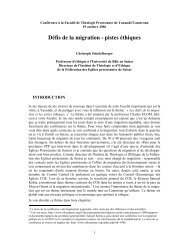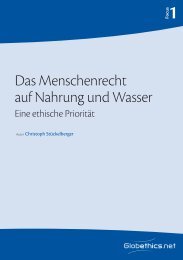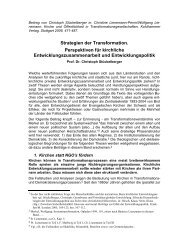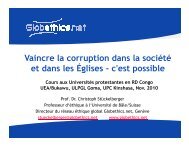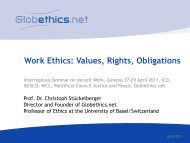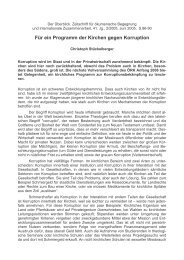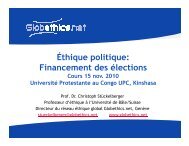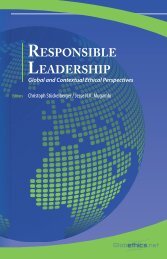BREAK THE CHAINS OF OPPRESION AND THE YOKE OF ...
BREAK THE CHAINS OF OPPRESION AND THE YOKE OF ...
BREAK THE CHAINS OF OPPRESION AND THE YOKE OF ...
You also want an ePaper? Increase the reach of your titles
YUMPU automatically turns print PDFs into web optimized ePapers that Google loves.
Litur gy<br />
the particular needs of the multilingual company in mind, the Lord’s Prayer was<br />
spoken in a multitude of languages and the sharing of bread and wine was accompanied<br />
by words in each participant’s own tongue. The ‘Holy Holy Holy’<br />
was sung by all rather than spoken by one. The words of institution were shared<br />
by a male and female ordained minister and the peace was shared among all. 14<br />
But this alone does not give explanation as to why it touched the hearts and<br />
minds of those present. The beauty and poetry of words, the meticulous attention<br />
to preparation and the grounding in biblical principles alone are not sufficient<br />
for creating such a touching place.<br />
Out of a situation of potential chaos, out of a requirement for order so that Reformed<br />
Christians from all over Europe conversing in more than one language<br />
would be able to participate, a liturgy for Holy Communion had been crafted<br />
with attention to detail, concern for inclusion, clarity of language and for the expression<br />
of biblical understanding of justice and justification of the unjust.<br />
‘The God of Scripture is not a God of disorder, but surely God’s ways are not our<br />
ways, nor are God’s thoughts our thoughts….’ 15<br />
Order had been created in that liturgy but into that order ultimately broke the<br />
One on whom all our worship depends. That is the One whose wild and exuberant<br />
Spirit is not in our control, whom too often we fear and seek to control<br />
against what we perceive to be too quickly as chaos and disorder.<br />
It had not been in the celebrant’s power to control or channel that Spirit, not<br />
even through the most exquisitely crafted liturgy of Holy Communion. Quite<br />
the opposite could have taken place also: that the Spirit would not deign to<br />
transform, move �or engage � - just �as the assembled � congregation � also could have<br />
refused to be open not only to the words of the liturgy but the prompting of the<br />
Spirit.<br />
‘Our Sunday services can become efforts to orchestrate intimacy without contact, to<br />
seek encounter without risk. The danger of losing control in our worship is an apparent<br />
danger to us but irrelevant to God.’ 16<br />
It appears that on this particular occasion intimacy sought through the crafting<br />
of the liturgy did lead to open contact with God. And the encounter hoped and<br />
prayed for through the shaping of the liturgy had taken place.<br />
14 While the original notes of this liturgy are no longer extant, similar invitations,<br />
prayers, hymns and liturgical actions can be consulted in the publications of the Iona<br />
Community as listed in the bibliography and also in the Book of Common Order of<br />
the Church of Scotland.<br />
15 Labberton, 47.<br />
16 Ibidem, 47.<br />
������������������������������������������������<br />
� � � � � �����������������������<br />
�<br />
108<br />
– <strong>THE</strong> LITURGY <strong>OF</strong> HOLY COMMUNION –



